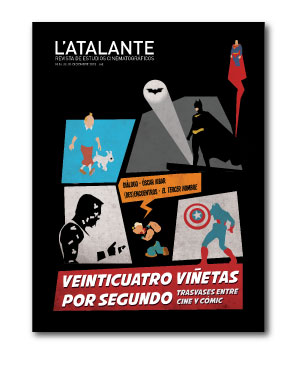Indiewood i les narratives de la crisi. La vigència de l’arquetip domèstic del New Deal.
Publicades 2013-07-01
Paraules clau
- Narratives de conversió,
- col•lapse econòmic,
- llar,
- Indiewood,
- New Deal
- imaginaris socials ...Més
Com citar
Resum
Segons Ross i May, John Ford i Frank Capra destaquen entre els directors vinculats a les narratives de conversió pel seu paper en la configuració del patró casolà nord-americà durant el New Deal, en especial a través de Las uvas de la ira i ¡Qué bello es vivir! Set dècades més tard, la presència de l’arquetip domèstic en les modernes narratives de la crisi es pot apreciar en els films de Jonathan Dayton, Valerie Faris, Jason Reitman o Tom McCarthy: quatre directors independents que han explorat les tendències socials d’un país sotmès primer a l’experiència traumàtica de l’11-S i, set anys després, a un col·lapse econòmic de repercussions globals. El present treball pretén explorar la vigència de l’imaginari domèstic en quatre produccions dels esmentats realitzadors contemporanis, igualment interessats en les històries de ciutadans ordinaris que veuen amenaçats les seues llars per una crisi de dimensions econòmiques, però també socials, morals i polítiques.
Descàrregues
Referències
BOGGS, Carl, y Tom POLLARD (2003). A World in Chaos. Social Crisis and the Rise of Postmodern Cinema. Lanham MD.: Rowmand & Littlefield.
CLINES, Peter. (2008). The Visitor. Screenplay by Tom McCarthy. Creative Screenwriting, March/April, p. 58.
GALLAGHER, Tag (1986). John Ford. The Man and His Films. Berkeley: University of California Press.
GLATZER, Richard (2004). A Conversation with Frank Capra. En L. POGUE (ed.), Frank Capra. Interviews (pp. 108-123). Jackson: University Press of Mississippi.
GOLDSMITH, Jeff (2011). Constructing a Win Win. Creative Screenwriting, March/April, pp. 14-19.
GOLDSMITH, Jeff (2009). Flying High. Jason Reitman and Sheldon Turner on Up in the Air. Creative Screenwriting, November/December, pp. 18-23.
GOLDSMITH, Jeff (2007). Road Trippin’. Michael Arndt’s Path to Little Miss Sunshine. Creative Screenwriting, January/February, pp. 67-70.
HEYRAUD, Joyce K. (2008). The Visitor 2008. Written and Directed by Tom McCarthy. Psychological Perspectives, 51, pp. 367-368.
JAMES, Nick (2010). No Place Like Home. Sight & Sound, February, 30-33.
KEOUGH, Peter (2011). Win Win. Review. 29/10/2012. Recuperada de <http://thephoenix.com/Boston/movies/117597-win-win/> 25/03/2011.
KINKLE, Jeff, y Alberto TOSCANO (2011). Filming the Crisis: A Survey. Film Quarterly, Fall, 65:1, pp. 39-52.
MAY, Lary (2000). The Big Tomorrow: Hollywood and the Politics of the American Way. Chicago: University of Chicago Press.
MISTICHELLI, Bill (1997). Capra, Altruism and the Sociobiologists. Journal of the Popular Film and Television, Fall, 25:3, pp. 118-129.
RAY, Robert B. (1985). A Certain Tendency of Hollywood Cinema 1930-1980. Princeton: Princeton University Press.
ROSS, Steven (2002). Movies and American Society. Oxford: Blackwell.
SELCER, Richard (1990). Home Sweet Movies. Journal of Popular Film and Television, Summer, 18:2, pp. 52-63.
SHINDLER, Colin (1996). Hollywood Crisis. Cinema and American Society 1929-1939. Londres: Routledge.
WAGNER, Walter (2001). One More Hurrah. En G. PEARY (ed.), John Ford. Interviews (pp. 151-160). Jackson, University Press of Mississippi.

